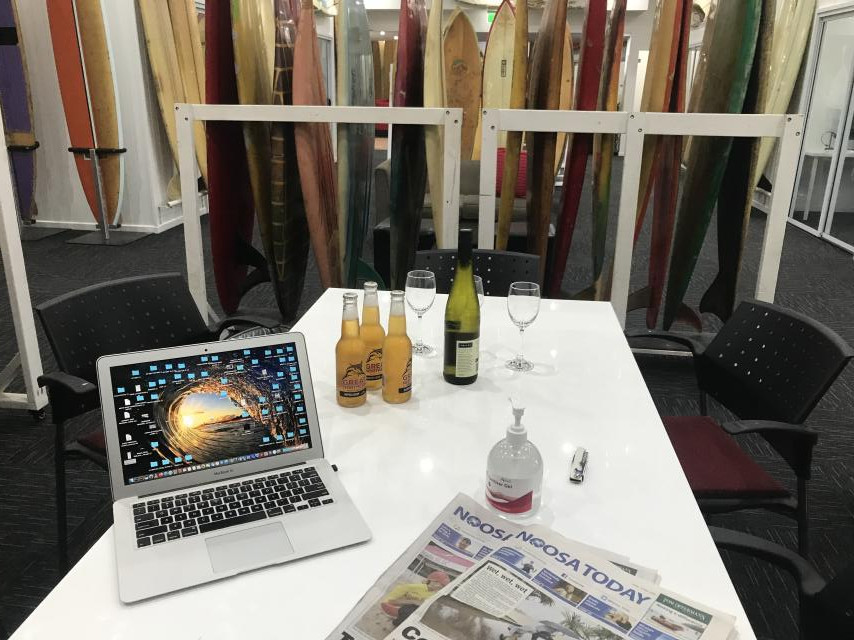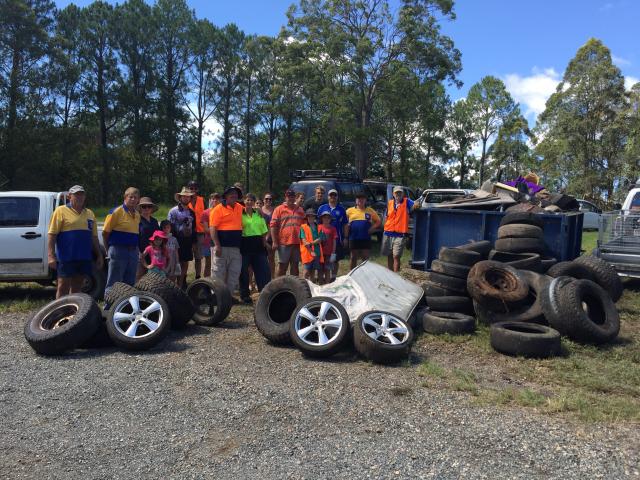Precede:
With the community consultation on waste strategy underway from this week, our Friday arvo beer swillers and wine guzzlers consider their verdict. PHIL JARRATT keeps them (more or less) orderly.
Ringleader: How big is the waste problem, both here in Noosa and globally? Are people exaggerating?
Female voice 1: Noosa is a lot better off than a lot of places I’ve travelled to around the world, due to the efforts of the general population over a number of years and also the programs that we’ve put in place, and the environmental groups that remind us of the issues every week, but I still think it’s a massive problem here and getting worse.
Female voice 2: I think Noosa Council has let the ratepayers down for a long time on domestic waste. Our waste management is way behind where it should be, compared to other council areas I visit. We don’t have a third organic waste bin, for example, and they’ve been in play elsewhere for ages. Watching people stuff their food waste into their landfill bins breaks my heart.
Ringleader: Where are the good councils, the ones getting it right?
FV2: Ballina Shire, Tweed Shire, for example. There, general waste bins are the last resort. Some of them don’t use it at all. In these places, the general education on waste has had an effect.
Male voice 1: To go back to your question, is it a problem? Yes, it is, and like all problems, we have to step back and examine what’s causing it. Here we have a consumerist society where products are not designed to last. Built-in obsolescence means you have to buy another widget every three years and throw the old one away. Advertising drives us towards generating a lot of waste, and the question is, what do we do with it? So if we accept that we are a consumerist society and there’s nothing we can do about that, then we are going to have a problem. Can that be changed? I’m not too sure, but I think it can.
FV2: Actually consumer waste is one area that Noosa Council has managed quite well.
MV1: Up until 2015 we only had the two-bin system – general waste and recycling. At that time council conducted a community jury process to look at the question of how to cut back what’s going into landfill. They came up with a green waste bin and, because the idea came from the community not the council, it was widely accepted. But food waste remained the missing link.
FV1: In New Zealand at a place called Kaikoura, which is about half the size of Noosa, they have a resource recovery centre where waste is broken up much better than ours because households get charged more if they put stuff in the wrong bins. Because of that, community groups get together and sort their own rubbish and deliver it broken up correctly to the recovery centre in someone’s ute. It started out a bit hip pocket nerve, but it became a cultural change.
Ringleader: That sounds like a great example of individual and community responsibility.
FV 1: Yeah, it’s best practice. People travel there from all over to look at how it works for their own communities.
MV2: I think the core of the problem is that we don’t need to do anything. It’s just so easy to throw everything in the bin without thinking about it.
MV1: The more people think and act like that New Zealand example helps the problem downstream, but we also have to think upstream about changing consumerism. I recently found a shop where they recycle old suitcases of second-hand stuff. That’s great thinking because it’s bought and sold and reused, whereas it would have ended up in landfill. The more we have of that, the smaller the problem becomes. And it’s the same with food waste. Do you throw it out or put it in a worm farm? The more we can divert stuff from going in the hole, the better off we’ll be.
MV2: The problem that I’ve seen with friends who’ve done the worm farm is that it’s not so easy, even on a small scale.
FV1: I beg to differ. I’ve seen it working on a small basis at a resort in Noosa where they have a basic three-tray digester. There are never any unpleasant smells from it. That’s usually fish or prawns in the general bins.
MV1: A couple of years ago Ipswich Council actually stopped their recycling because the level of contamination was so high. In Noosa it’s always been quite low because people are generally prepared to do what it takes. We’re all here for the same reason.
FV1: And now is the time to do it. It would have been awesome if we’d started a long time ago, but now we must.
MV1: If people are prepared to pay for it.
Ringleader: What you’ve touched on there is the great divide. Everyone seems convinced that we’re doing waste management right, yet we continue to create more waste. Shouldn’t the public awareness message be stop creating waste?
MV1: Well, there’s another theory about it which is, it’s not waste, it’s a resource. We need to get people thinking of it like that. And the technology to turn waste into resources is becoming more affordable.
FV1: There’s still a school of thought in the community that Noosa doesn’t recycle. It’s based on the idea that went around a few years ago that no matter what bin you put it in, your waste all ends up in the same hole. I think that shows that there needs to be some strong messaging around what’s really happening.
FV2: Remember The Chaser’s War On Waste?
FV1: That was the catalyst for a lot of this thinking.
FV2: Well, they tracked the container ships to the middle of the ocean where they just chucked the waste overboard. Not a positive message.
FV1: No, but it was a huge wake-up call to everyone that we have a big problem. But that doesn’t always translate into people’s behaviour. A classic example is that we have keep cups at the office where I work, but often people will come into work with a single-use plastic mug of coffee they just bought, tip the coffee into the keep cup and put the plastic mug in the bin. In the end, the people fighting plastics find that it either comes down to financial gain, or the fact that there are no single-use plastics available and you have no alternative.
MV1: The hip pocket incentive definitely works with bottles and cans, and with having to buy a bag at the supermarket unless you bring your own. But you have to reinforce that message every day.
MV2: Do you think that the many tourists who come here would have an expectation that Noosa would be waste-smart, being a Biosphere Reserve and so on?
FV1: Well, Booking.com has a sustainability report, and it’s recently gone up from 60 per cent to 73 per cent of visitors saying they are looking for a green alternative but when they arrive at a destination it often only meets their green expectations 35-42 per cent. The takeaway from that is that many destinations are not keeping up with what people want in that space.
MV2: So the tourists are ahead of us and we have to catch up! That’s a bit embarrassing. We have to get with the program.
FV1: I have to say that in many ways Noosa is ahead of the game. Things like events doing the right thing with plastic and recycling, and council’s support of organisations like Plastic-Free Noosa and Zero Emissions Noosa. Plastic-Free Noosa has 69 champion businesses on its books who have completely eliminated single use products.
MV1: Getting back to the landfill, part of the problem is that it’s far cheaper to build a hole than do anything about it. In Europe the land bank is small and the population huge, so it doesn’t make any sense to bury waste in the ground. Here we’ve got fewer people and much more land, but the fact that in Noosa we have spare capacity at the landfill is both a blessing and a curse. The blessing is that we have time to plan and make the right decisions for the future. The curse is that there’s no imperative to change.
MV2: We have a really strong identity here and I think it’s important for that to continue to improve our sustainability, but we need to turn it up a bit in relation to turning waste into resources and how we do that.
MV1: That’s true, but you’re talking about how you do it, while the questions being asked in the community consultation are based around why we need to do it. If you ask the question, are you prepared to pay to find a solution to our waste problem? And the answer is no, then how you do it doesn’t really matter.
Ringleader: What’s the most important thing we need to learn through the community consultation about people’s attitude to waste?
FV1: I think it’s, do you get that we’re creating too much waste? I hope that people do get that, but then why would they continue to do what they do?
FV2: I don’t think that it’s council’s role to modify human behaviour. Does anyone?
MV1: Other than educating people about the impact of their behaviour, no. But what’s the most important thing we need to learn from the community? I think there are two. The first is to gauge the level of understanding that waste is a community issue, not just a council issue. The second thing is, if we want to fix it, are we prepared to pay for it? I’m actually optimistic that we can turn this around because we’ve done it before, with smoking, water and now electric cars.
FV2: Not only do we change, but we just drop things that we thought we couldn’t live without like they never existed, and we move on.










